Goodbye after 25 years: Leibniz-IZW bids farewell to long-time director Prof Heribert Hofer
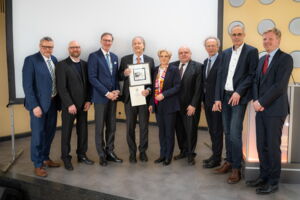
On 28 March 2025, the Leibniz Institute for Zoo and Wildlife Research (Leibniz-IZW) bid farewell to its director Prof Heribert Hofer after more than 25 years in office. His temporary successor, Prof Jörns Fickel, head of the Department of Evolutionary Genetics, will take over on 1st April 2025. A joint appointment for the directorate of the Leibniz-IZW and the professorship for Interdisciplinary Zoo and Wildlife Research at the Freie Universität Berlin is underway.
The behavioural ecologist Heribert Hofer took over as director of the Leibniz-IZW on 1st January 2000 and has led the institute to the present day. He was also head of the Department of Evolutionary Ecology until 2017. During his 25 years as director, the Leibniz-IZW was positively evaluated three times (2006, 2013, 2020) and successfully applied for a major expansion project for the institute entitled “Record, Assess, Intervene – using high-tech for wildlife research in the Anthropocene”. The Leibniz-IZW has undergone a fundamental transformation in the quarter of a century Hofer has been active – from a small, little-known institute in the east of Berlin to a modern, internationally renowned, cutting-edge research facility that conducts wildlife research for conservation in the context of global environmental change. With the Leibniz-IZW, Hofer developed a comprehensive mission and vision that linked the many excellent research projects within the framework of their evolutionary context and always faced up to the urgent challenges of species conservation in the Anthropocene.
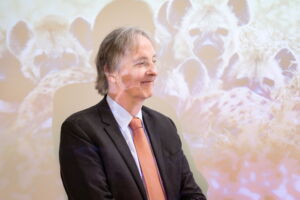
“When I arrived here at the Leibniz-IZW at the end of 1999, the institute was organised very differently than it is today. In large parts of zoological science in Germany, the move to become director of an East German Leibniz Institute was seen as a step backwards”, recalls Hofer. “The institute was still very much characterised by the upheavals of the reunification period in Germany – it had only been founded anew seven years earlier – and the institute lacked a comprehensive mission and vision as a framework for its research, some of which was already excellent at the time. In addition, as a former East German institute, it had to be introduced to the international scientific community. When I started, I said that we wanted it to become one of the leading European wildlife research institutes within ten years. Some people at the institute were astonished and sceptical as to whether this could be achieved. But I thought that the institute had all the prerequisites and the spectrum of scientists to achieve this.” Hofer also emphasises the importance of holistic wildlife research from the molecular to the landscape level and the productive combination of excellent basic research with research of immediate conservation relevance as achievements of the institute over the last 25 years. “We made significant contributions to understanding the adaptability of wildlife and to tackling the biodiversity crisis. I am proud that we are better positioned conceptually, methodologically and financially than ever before. We have the best generation of scientists we have ever had and we can make a real difference for conservation.”
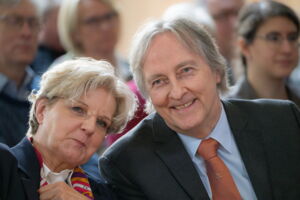
The institute has undergone fundamental development in recent years, not only in terms of its aim and scope but also structurally. The Leibniz-IZW has doubled the number of its employees and realised two building extensions, which enabled essential new research infrastructures such as the veterinary clinical area, the computer tomograph and state-of-the-art laboratories, and gave the growing institute the space it needed. Hofer also established two new scientific departments, the Departments of Evolutionary Ecology and Ecological Dynamics, and founded the Science Management as an integrated functional unit for science communication and transfer, stakeholder dialogue and citizen science. In doing so, he strengthened the interface between science and society in line with the institute’s goal of making research results usable and effective for conservation in society.
At the ceremony to mark his farewell on 28 March 2025 at Tierpark Berlin, colleagues, companions and long-standing partners paid tribute to Prof Hofer's work for the Leibniz-IZW and German wildlife research.
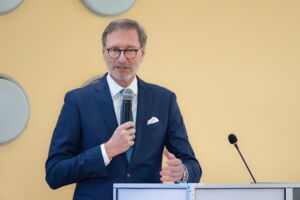
Dr Andreas Knieriem, Director of Berlin Zoo, Tierpark und Aquarium:
„Since their establishment, the IZW and Tierpark Berlin have been closely linked – a collaboration that continues to provide valuable insights for the protection of endangered species. The exchange between zoological institutions and research institutes such as the IZW is essential in order to develop sustainable conservation measures and create a scientific basis for the preservation of biodiversity. Professor Dr Heribert Hofer has shaped this exchange with great commitment for many decades and has thus rendered a great service to Tierpark Berlin. Fortunately, Prof Hofer will remain with us as a valuable member of the Board of Trustees of our Zoo Foundation. I wish him all the very best for his new chapter in life and would like to thank him personally for his valuable contribution to the welfare of our animals.”
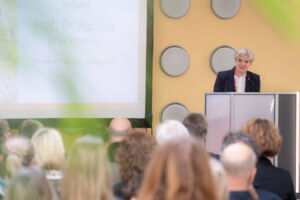
Prof Martina Brockmeier, President of the Leibniz Association:
The President of the Leibniz Association honours the extraordinary commitment of Heribert Hofer, who headed the Leibniz Institute for Zoo and Wildlife Research for 25 years. “As an active member of the Association, he has been responsible for important milestones. For over 13 years, Heribert Hofer has campaigned for equality and equal opportunities. His remarkable commitment and his ability to emphasise the positive in everything are always a great asset. For Heribert Hofer, the glass is always half full! His ability to unite individual interests has contributed significantly to the scientific excellence and success of the Leibniz Association.”
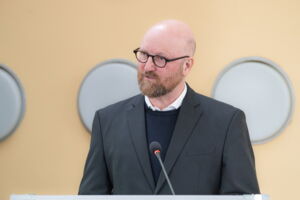
Dr Björn Maul, Head of the Division for Natural Sciences, Material Sciences and Life Sciences, Berlin Senate Department for Higher Education and Research, Health and Long-Term Care:
“During his time in office, the institute has definitively become an internationally renowned institution in its field – zoo and wildlife research – that is focussed on state-of-the-art research approaches. Prof Heribert Hofer and his highly motivated team have always made the IZW an important and indispensable partner in Berlin's scientific landscape – a major contribution to the city's reputation as a centre of cutting-edge research.”
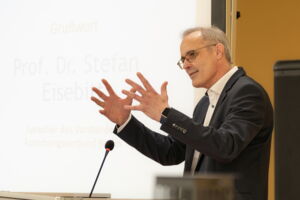
Prof Stefan Eisebitt, Spokesperson of the Board of the Forschungsverbund Berlin e.V.:
„ The Forschungsverbund Berlin – with its currently seven research institutes one of the largest non-university research institutions in Berlin – owes Prof Heribert Hofer a great debt of gratitude from several perspectives:
As director of the Leibniz Institute for Zoo and Wildlife Research, he has continuously and very successfully developed and shaped the institute over a period of more than 25 years. Under his leadership, field research on animals in natural habitats was established at the institute both in Germany and overseas. A particular merit is that he was able to organise this research in a way that was both academically excellent and at the same time practice-oriented, involving all relevant stakeholders, so that it could be put at the service of nature conservation.
Parallel to his work at the IZW, Prof Hofer, as a member of the board of the Forschungsverbund Berlin and as its spokesperson from 2003 to 2005, also decisively shaped the Forschungsverbund Berlin as a whole with his committed, cooperative and strategic approach and contributed significantly to its success.”
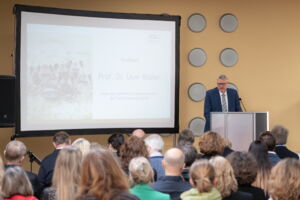
Prof Uwe Rösler, Dean of the Faculty of Veterinary Medicine at Freie Universität Berlin:
„The IZW is one of the most important co-operation partners of the two Faculties of Veterinary Medicine and Biology, Chemistry and Pharmacy at Freie Universität Berlin. Heribert Hofer stands for this close, friendly and collegial cooperation like no other. He is always present at ‘his’ two faculties and is always available with advice and, above all, action. Heribert Hofer and the IZW have opened up completely new opportunities for us and our veterinary students in zoo and wildlife medicine.“
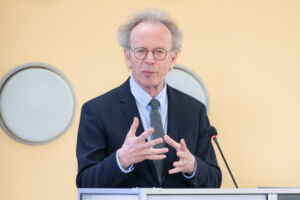
Prof Martin Lohse, Vice President of the Society of German Natural Scientists and Physicians (GDNÄ):
„The first thing that strikes you about Heribert Hofer is the sparkle in his eyes and the smile with which he approaches people – especially when he meets young people. For many years, he has organised science slams with schoolchildren at the conferences of the Society of German Natural Scientists and Physicians (GDNÄ), the oldest interdisciplinary association for science in Germany. These were always exciting, informative and often funny hours that attracted and inspired a large audience. As President of the Society, he has given this enthusiasm a new form and founded the Young GDNÄ. It was a pleasure to work with him in this society and to experience and share his infectious enthusiasm for science and knowledge transfer.“
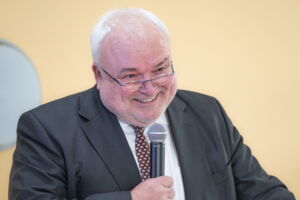
Prof Jörg Junhold, Director of Leipzig Zoo, President of the Verband der Zoologischen Gärten VdZ (German Association of Zoological Gardens):
„Today we say goodbye to Heribert Hofer, a full-blooded scientist with a heart for nature and species conservation, animal welfare and the constant pursuit of solutions for the safe living of wildlife, as he enters his well-deserved retirement. He has been a close companion and advisor to a whole generation of scientists, zoologists and conservationists as well as their offspring. I would like to thank him on behalf of all my colleagues in German-speaking zoos for his expertise and practical support. His work is exemplary –- and sustainable. His knowledge will continue to influence international conservation.”
Contact
Leibniz Institute for Zoo and Wildlife Research (Leibniz-IZW)
in the Forschungsverbund Berlin e.V.
Alfred-Kowalke-Straße 17, 10315 Berlin
Prof Jörns Fickel
Head of the Department of Evolutionary Genetics and Acting Director
phone: +49(0)30 5168100
email: fickel@izw-berlin.de
Jan Zwilling
Science Communicaiton
phone: +49(0)30 5168121
cell: +49(0)1512 6764603
email: zwilling@izw-berlin.de
All photos on this page by Jan Zwilling/Leibniz-IZW

